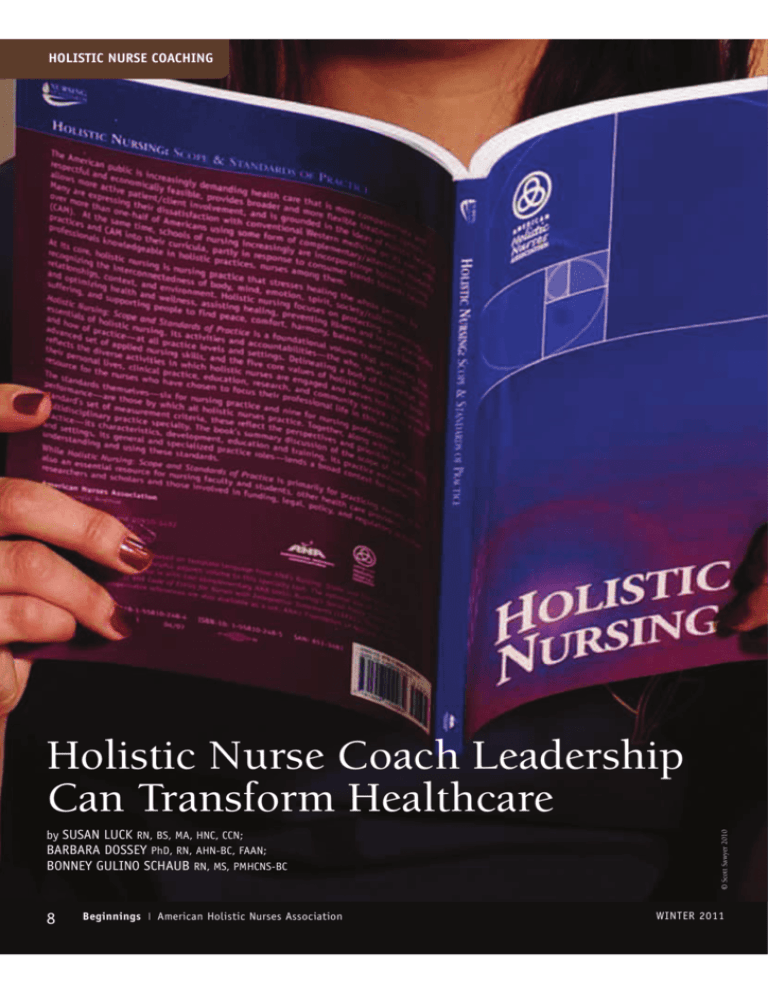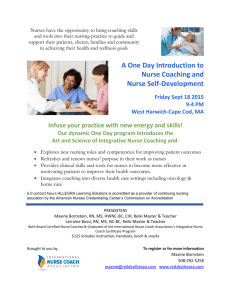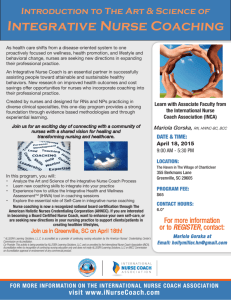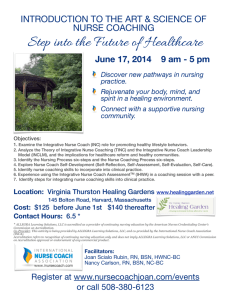Holistic Nurse Coach Leadership Can Transform Healthcare
advertisement

HOLISTIC NURSE COACHING by SUSAN LUCK RN, BS, MA, HNC, CCN; BARBARA DOSSEY PhD, RN, AHN-BC, FAAN; BONNEY GULINO SCHAUB RN, MS, PMHCNS-BC 8 Beginnings | American Holistic Nurses Association © Scott Sawyer 2010 Holistic Nurse Coach Leadership Can Transform Healthcare WINTER 2011 Holistic nurses have many of the tools that are part of core coaching competencies, including relationship-centered care. A n important component of healthcare reform is a renewed focus on wellness, prevention and health promotion. It has been proposed that health coaches play a major role in the delivery of these services to patients and consumers. Registered professional nurse coaches are the ideal practitioners to take a leading role in this healthcare delivery model. Coaching has become a rapidly growing role in the private and corporate sector. The goals of wellness and lifestyle coaching in health care are to improve health outcomes and reduce health costs for individuals, employers, insurance companies and the nation. This development provides nurses with an exciting opportunity to reclaim, reaffirm and expand their role in health promotion, health education, patient support, and advocacy by adding coaching expertise to their professional skills. According to the National Centers for Disease Control and Prevention, more than 133 million adults, or nearly half of all adults in the United States, are living with at least one chronic disease such as obesity, diabetes and cardiovascular disease (Centers for Disease Control and Prevention, 2010). According to a new report released Nov. 15, 2010, by health insurer UnitedHealth Group Inc, more than half of Americans will have diabetes or be pre-diabetic by 2020 at a cost to the U.S. healthcare system of $3.35 trillion if current trends go on unabated (UnitedHealth Group, n.d.). Growing evidence shows, and experienced nurses know, that the suffering these diseases produce can be reduced or prevented through education and behavioral changes. Nurses, through their professional outreach to the organizations, communities, work settings, schools and individuals that they serve, are in an ideal position to implement this vision by providing the necessary guidance, support, motivation and expertise. WINTER 2011 In 2009, the Samueli Institute (Jonas, 2009) crafted a document promoting a Wellness Initiative for the Nation (WIN) in collaboration with leaders in the fields of health policy, health promotion, and integrative healthcare practices. The authors suggested several important ways to help move the United States towards a more healthy society with a greatly expanded wellness and prevention infrastructure. The Wellness Initiative proposed training thousands of full-time, community based “health and wellness” coaches to work on chronic disease prevention through comprehensive lifestyle and integrative healthcare approaches with a mission to transform health care and the health of our nation. Nurses Speak Both the Language of Health Care and of Whole-Person Healing From a holistic nursing perspective, it is imperative that coaches have a broad foundation of clinical knowledge, experience and skills, as well as a strong foundation in professional ethics, to offer supportive tools and strategies for improving long-term health. With more than 3 million nurses in the U.S. workforce in all sectors of health care — including communities and corporations — nurse coaches will have the opportunity to promote the value of new models for health, resiliency and well-being. This model has proven to be most effective when implemented in primary prevention, management of chronic medical issues, avoiding hospitalization, and post hospitalization aftercare—all sectors where nurses have already assumed the role of health coach. Recently, the International Council of Nurses (ICN), partnered with the Honor Society of Nursing, Sigma Theta Tau International in releasing “Coaching in Nursing,” a document that emphasizes nursing leadership’s role in creating coaching standards and establishing a relationship between health and wellness coaching and nursing (Donner & Wheeler, 2009). Holistic Nursing Leadership in a Nurse Coach Model On a national level, in both education and health policy, there is a growing concern for establishing educational competencies and standards of practice for health coaches—and there are many questions being asked about who will fill this role. Several professional coaching programs have been created, including those at Duke University, Harvard, and at the University of Minnesota’s Center for Spirituality and Healing. Many disciplines, including psychology, medicine, pharmacy and nursing, are exploring a professional certification for healthcare coaches. It is an important moment for nursing to take a leadership role as coaching certification is imminent across diverse professions. This has implications for future health policy, reimbursement, and for changing the health of our nation. Nurse coaching is a new area of expertise and a new skill set that can build upon a holistic nursing foundation. An authentic coaching relationship is not counseling. It is now evident that there is a need to develop nurse coach and nurse coaching definitions and competencies. Holistic nurses have many of the tools that are part of core coaching competencies, including a focus on relationship-centered care. In addition, we have both AHNA’s and ANA’s Scope and Standards of Holistic Nursing Practice (American Holistic Nurses Association/ American Nurses Association, 2007). As nurses, we come into the coaching role skilled and educated in giving expert holistic nursing advice as well as offering noninvasive modalities to enhance the healing process. Although these continued on page 10 American Holistic Nurses Association | Beginnings 9 Nurse coaching is a new area of expertise and a new skill set that can build upon a holistic nursing foundation. are all vital services that we provide to enhance well-being in individuals, it is different from coaching. Nurse coaches assist individuals in accessing their inner wisdom and in motivating and deepening their awareness for behavioral change. Holistic nurses often have an orientation in counseling, educating and instructing their patients and clients on the healthier choices that are essential along the continuum to wellness. In June 2010, the AHNA appointed a Nurse Coach Task Force to address professional nurse coaching and to explore a national holistic nurse coach certification process. In September 2010, AHNA Leadership Council representatives and the AHNA Nurse Coach Task Force participated in an invitation-only, National Professional Coaching Summit sponsored by Harvard, to establish professional core competencies, educational standards, and to develop a certification process for professional coaches. In preparation for this meeting, the AHNA Nurse Coach Task Force drafted the White Paper: Holistic Nurse Coaching (Hess, Bark, & Southard, 2010). They presented this paper to the entire Summit, demonstrating and educating other disciplines about how holistic nurses, with their scope of practice and strongly defined foundation of professional ethics and deep understanding of the nurse patient relationship, are in the position to lead this national effort for the emerging coaching model. An integrative, holistic nurse coach model presents our profession with exciting and creative opportunities to be leaders in transforming health care, as new models in nursing leadership emerge and are supported by the U.S. Institute of Medicine and the ANA. Nurse coaching along with certification leading to reimbursement opportunities 10 has the potential to strengthen holistic nursing’s role in the transformation of our healthcare system and the health of our nation. References American Holistic Nurses Association/American Nurses Association. (2007). Holistic Nursing: Scope and standards of practice. Silver Spring, MD: Nursesbooks.org. Centers for Disease Control and Prevention. (2010). Vital signs: State-specific obesity prevalence among adults — United States, 2009. Morbidity and Mortality Weekly Report, 59, 1-5. Donner, G., & Wheeler, M. (2009). Coaching in nursing: An introduction. Indianapolis, IN: International Council of Nursing & Sigma Theta Tau. Retrieved November 27, 2010, from http://www.icn.ch/ images/stories/documents/pillars/sew/ coaching_in_nursing.pdf. Hess, D., Bark, L., & Southard, M.E. (2010, September). White paper: Holistic nurse coaching. Summit on standards & credentialing of professional coaches in healthcare & wellness. Paper presented to National Credentialing Team for Professional Coaches in Healthcare, Boston, MA. Retrieved from http://www.wellcoach.com/images/ WhitePaperHolisticNurseCoaching.pdf Jonas, W. (2009). Wellness Initiative for the Nation, 2009. Retrieved November 27, 2010, from http://www.samueliinstitute. org/news/news-home/WIN-Home.html UnitedHealth Group. (n.d.). Addressing the growing epidemic of diabetes and prediabetes. Retrieved November 27, 2010, from www. unitedhealthgroup.com/diabetes. Editor’s Note: The authors of this article were all members of the AHNA Nurse Coach Certification Task Force, which has been disbanded. They have partnered in creating an Integrative Nurse Coaching Certificate Program (INCCP) for holistic nurses. To learn more about the program, go to: www.integrativenursecoach.com Beginnings | American Holistic Nurses Association Susan Luck RN, BS, MA, HNC, CCN is a holistic nurse educator, medical anthropologist and clinical nutritionist who has been practicing in integrative healthcare models both in the United States and abroad, specializing in nutrition, immunology, and women’s health and the environment. She is currently director of the Integrative Nursing Institute, an educational organization focusing on holistic nursing leadership. She is core faculty in the Integrative Nurse Coach Certification Program (INCCP) and is program director for the Integrative Nursing Institute. She continues to maintain a private practice as an Integrative Nurse Coach. www.earthroseinstitute.org and www.integrativenursinginstitute.org Barbara Dossey PhD, RN, AHN-BC, FAAN is internationally recognized as a pioneer in the holistic nursing movement. She is a Florence Nightingale scholar and a nurse theorist. She is International co-director of the Nightingale Initiative for Global Health (NIGH); co-director of the Integrative Nurse Coach Certificate Program (INCCP), Huntington, N.Y.; and director of Holistic Nursing Consultants (HNC), Santa Fe, N.M. She has authored or co-authored 23 books including Florence Nightingale: Mystic, Visionary, Healer (2010, Commemorative Edition); Holistic Nursing: A Handbook for Practice (5th ed., 2008); and Florence Nightingale Today: Healing, Leadership, Global Action (2005). www.dosseydossey. com and www.nightingaledeclaration.net. Bonney Gulino Schaub RN, MS, PMHCNS-BC is co-director of the Integrative Nurse Coach Certificate Program (INCCP) and co-director of the Huntington Meditation and Imagery Center (HMIC). Bonney has trained and mentored the careers of hundreds of health professionals internationally in the clinical uses of meditation and imagery. She integrates these and other mind/body skills into her coaching practice. Bonney has co-authored, with her husband Richard, three books on the process of healing and new development: Healing Addictions: The Vulnerability Model of Recovery (2007); Dante’s Path: A Practical Approach to Achieving Inner Wisdom (2005); and The End of Fear: A Spiritual Path for Realists (2009). www.huntingtonmeditation.com WINTER 2011








